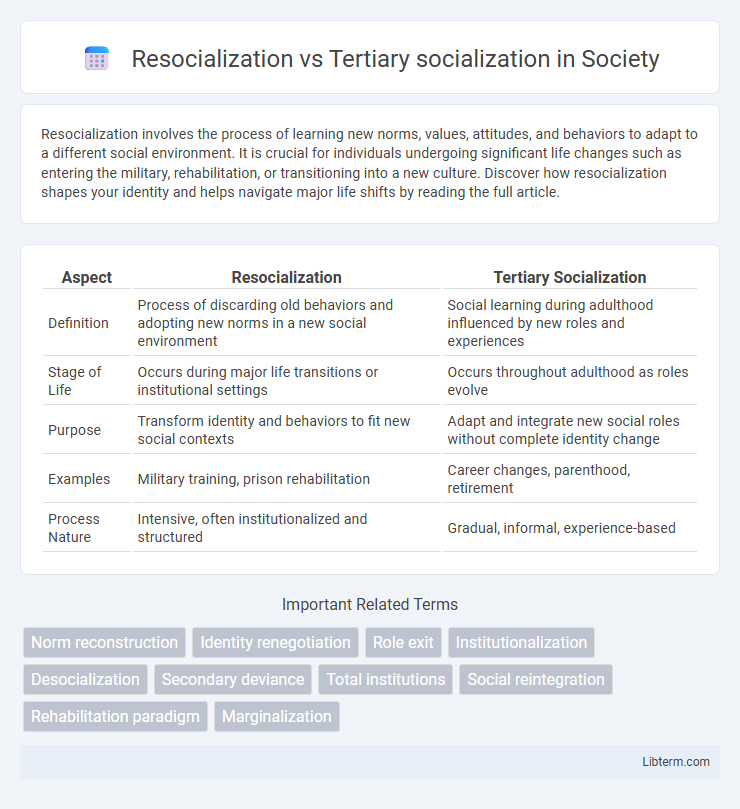Resocialization involves the process of learning new norms, values, attitudes, and behaviors to adapt to a different social environment. It is crucial for individuals undergoing significant life changes such as entering the military, rehabilitation, or transitioning into a new culture. Discover how resocialization shapes your identity and helps navigate major life shifts by reading the full article.
Table of Comparison
| Aspect | Resocialization | Tertiary Socialization |
|---|---|---|
| Definition | Process of discarding old behaviors and adopting new norms in a new social environment | Social learning during adulthood influenced by new roles and experiences |
| Stage of Life | Occurs during major life transitions or institutional settings | Occurs throughout adulthood as roles evolve |
| Purpose | Transform identity and behaviors to fit new social contexts | Adapt and integrate new social roles without complete identity change |
| Examples | Military training, prison rehabilitation | Career changes, parenthood, retirement |
| Process Nature | Intensive, often institutionalized and structured | Gradual, informal, experience-based |
Introduction to Socialization Processes
Resocialization involves the process of unlearning previous behaviors and norms to adopt new ones, often occurring during significant life transitions or institutional settings such as prisons or rehabilitation centers. Tertiary socialization refers to the continual adaptation and learning that adults undergo to adjust to new roles, environments, or cultural contexts after primary and secondary socialization phases. Understanding these socialization processes is crucial for analyzing how individuals reshape their identities and social skills throughout different stages of life.
Defining Resocialization
Resocialization is the process through which individuals undergo significant behavioral and belief changes by discarding previous social norms and adopting new ones, often occurring in total institutions like prisons or military boot camps. Unlike tertiary socialization, which involves refining and expanding existing social identities in adulthood, resocialization fundamentally transforms one's self-concept and social role. This process is critical during major life transitions requiring a break from former social environments and established habits.
Understanding Tertiary Socialization
Tertiary socialization refers to the process of adopting new values, beliefs, and behaviors during adulthood as individuals encounter significant life changes or shifts in social roles, often influenced by media, workplace, or community groups. Understanding tertiary socialization highlights its role in continuous personal development beyond early socialization stages, facilitating adaptation to new environments and societal expectations. This form of socialization contrasts with resocialization, which involves more intensive relearning and unlearning of values, often occurring in total institutions like prisons or military service.
Key Differences Between Resocialization and Tertiary Socialization
Resocialization involves the process of discarding previous behaviors and adopting new norms, often occurring in total institutions like prisons or military boot camps, where individuals undergo radical identity transformation. Tertiary socialization focuses on adults adjusting and adapting to new roles later in life, such as changing careers or entering parenthood, emphasizing gradual learning rather than complete behavioral overhaul. The key differences lie in the intensity and context: resocialization is abrupt and comprehensive, whereas tertiary socialization is incremental and role-specific.
Stages of Resocialization Explained
Resocialization involves unlearning old behaviors and adopting new norms, typically occurring in total institutions like prisons or military boot camps, where individuals undergo distinct stages: breaking down existing identities, a transitional phase of uncertainty, and rebuilding a new self-concept aligned with institutional values. Tertiary socialization refers to the process adults experience when adopting new roles or entering new environments, often less intense and more self-initiated compared to resocialization. Understanding these stages highlights how resocialization critically restructures identity through systematic reinforcement, whereas tertiary socialization facilitates gradual adaptation to new social contexts.
Contexts and Examples of Tertiary Socialization
Tertiary socialization occurs primarily in adult contexts such as workplaces, community groups, or online social networks where individuals adapt to new roles or environments, contrasting with resocialization that often involves drastic identity changes like those in rehabilitation or military settings. Examples include adults learning corporate culture during job transitions, joining professional associations, or adapting to evolving social norms in digital communities. These settings facilitate continuous social learning critical for maintaining social integration and personal identity in a rapidly changing social landscape.
Psychological Impact of Resocialization
Resocialization involves a profound psychological impact as individuals undergo a fundamental shift in beliefs, values, and behaviors to adapt to new social environments, often leading to identity reconstruction and emotional stress. Its intensity contrasts with tertiary socialization, which typically refines existing roles rather than overhauling them, resulting in less psychological upheaval. Effective resocialization requires supportive environments to mitigate anxiety and promote successful integration into altered social contexts.
Role of Institutions in Both Socialization Types
Institutions such as prisons, rehabilitation centers, and the military play a crucial role in resocialization by systematically dismantling previous identities and instilling new norms and behaviors aligned with societal expectations. In tertiary socialization, institutions like workplaces, clubs, and religious organizations facilitate the gradual adaptation to new roles or lifestyles, reinforcing existing self-concepts while encouraging personal growth. Both socialization types rely heavily on institutional frameworks to shape individual behavior but differ in intensity and purpose, with resocialization involving more profound identity transformation and tertiary socialization promoting continuous, less drastic adjustments.
Challenges in Achieving Successful Resocialization and Tertiary Socialization
Challenges in achieving successful resocialization often stem from deep-seated habits and identity conflicts, as individuals must unlearn previous behaviors and adopt new norms, which requires intensive psychological adjustment. Tertiary socialization poses difficulties in integrating into new social roles or communities later in life, where established values and social expectations may clash with prior experiences, causing resistance or identity fragmentation. Both processes demand continuous support and adaptive learning environments to overcome internal and external barriers effectively.
Conclusion: Societal Significance of Advanced Socialization Processes
Resocialization and tertiary socialization play crucial roles in adapting individuals to evolving societal norms and complex social environments. Resocialization facilitates significant behavioral changes due to drastic life transitions, while tertiary socialization supports ongoing identity refinement through media, technology, and peer influences. Together, these advanced socialization processes sustain social cohesion and individual competence in dynamic, modern societies.
Resocialization Infographic

 libterm.com
libterm.com